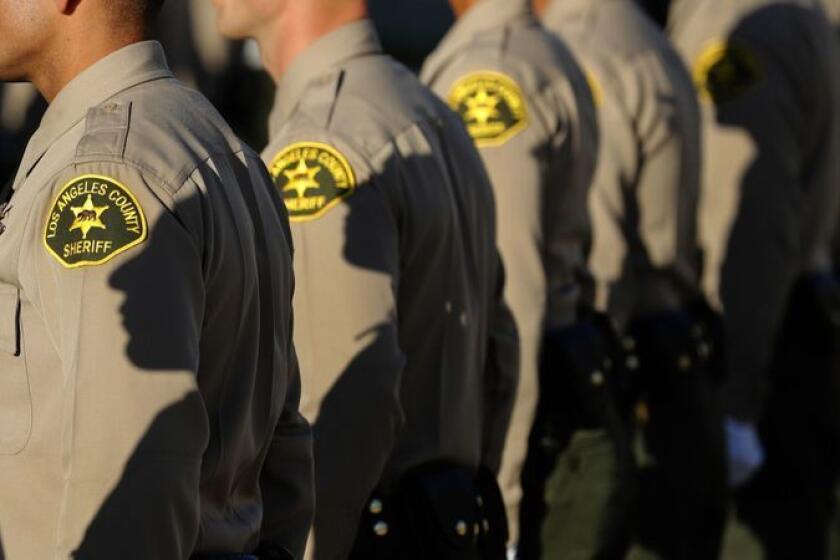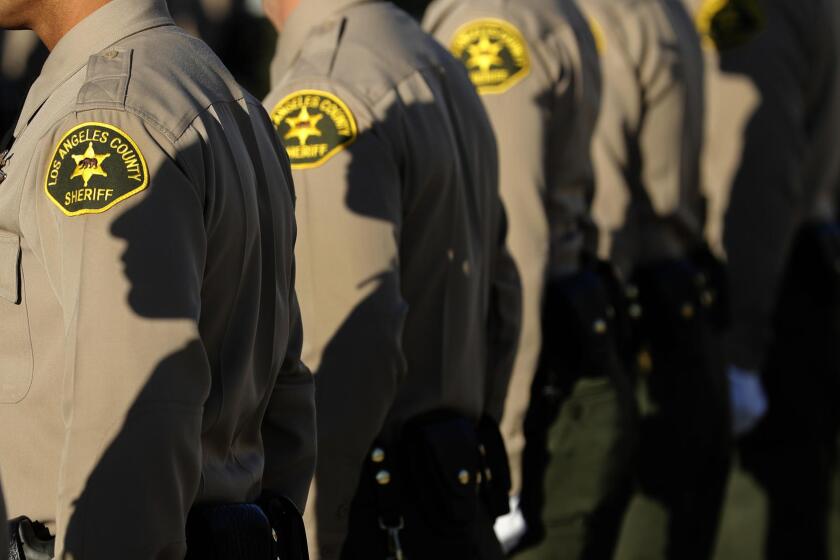Few police agencies have given L.A. prosecutors the names of dishonest cops

Four months after Dist. Atty. George Gascón sent a request to law enforcement agencies across Los Angeles County, more than 40 departments have yet to provide his office with names of officers who have histories of dishonesty and other misconduct that could affect their credibility in court.
Only a half-dozen agencies have submitted names of officers who have been disciplined for wrongdoing, which prosecutors are obligated to disclose to the defense in criminal cases. A dozen say they have no officers who fit the description.
Greg Risling, a district attorney’s spokesman, said all agencies have vowed to cooperate, but gaining compliance has taken longer than expected because police wanted to consult with their legal counsel and officer unions to make sure they weren’t violating state laws that protect police privacy.
In response to concerns raised by the departments, the district attorney’s office created a committee of police chiefs across the county to come up with a method that would ensure prosecutors are informed of previous dishonesty and other serious misconduct committed by officers who could be called to testify in pending criminal cases.
Prosecutors have a constitutional duty to give defense attorneys evidence that could cast doubt on a defendant’s guilt or reduce a potential sentence, including information that could diminish the credibility of prosecution witnesses. That obligation stems from a landmark 1963 U.S. Supreme Court case, Brady vs. Maryland, which requires prosecutors to alert defendants to favorable evidence.
Loyola Law School professor Laurie Levenson said it is concerning that police agencies have been reluctant to immediately turn over such crucial information.
“So much of this has been politicized as somehow not supportive of law enforcement because you want to get these records,” said Levenson, a former federal prosecutor. “And that’s just not the case. These records are terribly important to weed out the bad officers and to make sure defendants are having fair trials.”
Among the dozens of agencies yet to turn over names is the Los Angeles County Sheriff’s Department, which has about 10,000 sworn deputies.
Sheriff’s Capt. John Satterfield said the agency is collaborating with the prosecutor’s office to create a process to share information, but no time frame has been set for when that will begin. The efforts have been hampered by staffing shortages and the “size and complexity” of the nation’s largest sheriff’s department, he said.
The department, he said, has given prosecutors the names of deputies who have sustained findings of dishonesty that are now public under California’s landmark police transparency law that took effect in 2019.
The Los Angeles Times is one of 33 newsrooms across the state that have formed a collaborative to analyze police records that became public under a transparency law that took effect this year.
The Long Beach Police Department does not maintain a so-called Brady list, but it continues to comply with its obligations to share such information, according to a department spokesman. The request from the district attorney’s office included “a broad range of information,” and the department “has responded within the legal parameters” after consulting the Long Beach city attorney and the Los Angeles County Police Chiefs Assn., the spokesman said.
The Pasadena Police Department did not respond to a request for comment on why it has yet to turn over officer names.
The Los Angeles Police Department, which has about 9,500 sworn officers, is the largest agency to share misconduct information about officers that could be used by defense attorneys to challenge — or impeach — their credibility during criminal cases, according to the district attorney’s office.
Though the department does not maintain a Brady list of officers and does not intend to create one, it has been cooperating with county prosecutors to share such information about officers’ past misconduct on a rolling basis, said Lizabeth Rhodes, director of the department’s Office of Constitutional Policing and Policy.
“We are committed to making sure that our justice system has as much integrity as possible,” Rhodes said.
Gascón’s office recently held a training session with the LAPD to go over how to provide the appropriate information about officers’ misconduct, and his office is scheduling additional sessions with other agencies, Risling said.
In addition, the police departments of Arcadia, Cal State Northridge, Covina, Culver City and El Monte have shared names of officers with potential Brady information in their personnel file, he said.
“We are pleased that we are moving forward and working together to establish a process for getting Brady lists or Brady alerts from police agencies,” Risling said.
He would not say how many officer names have been forwarded.
The dozen agencies that said they had no officers with potential Brady material in their personnel file on pending cases were Baldwin Park, Beverly Hills, Burbank, Cal State Dominguez Hills, El Segundo, Monrovia, San Fernando, San Marino, Sierra Madre, Torrance, Vernon and UCLA.
The California Highway Patrol and the California Department of Corrections and Rehabilitation have told the prosecutor’s office that they are working on a system to provide a list of officers with Brady issues to prosecutors on all pending cases, Risling said.
In his February letter to the county’s 60 law enforcement agencies, Gascón requested the names and employee numbers of current and former deputies and officers “who have engaged in acts of moral turpitude,” including those with sustained findings of tampering with evidence, misappropriating property, dishonesty, family violence and other wrongdoing.
Dist. Atty. George Gascón has requested that law enforcement agencies across L.A. County provide his office with the names of deputies and officers who have histories of misconduct that might affect their credibility in court.
“A prosecutor has the duty to learn of any favorable evidence known to the others acting on the government’s behalf in the case,” Gascón said in a copy of the letter reviewed by The Times. “When law enforcement fails to communicate impeachment information to the prosecutor, the prosecution remains accountable for the consequence. Such consequences can include sanctions and the reversal of convictions.”
The letter cites an August 2019 decision in which the California Supreme Court ruled that the L.A. County Sheriff’s Department, as well as other law enforcement agencies, can alert prosecutors that a deputy who might testify in a criminal case has a history of misconduct.
The state Supreme Court case stemmed from an effort by former L.A. County Sheriff Jim McDonnell to give prosecutors the names of about 300 deputies on the agency’s Brady list. The Assn. for Los Angeles Deputy Sheriffs, the union that represents rank-and-file deputies, sued to try to block the disclosure, arguing that providing prosecutors with such a list would violate the state’s police privacy laws.
After the state Supreme Court’s ruling, however, prosecutors never requested a copy of the Sheriff’s Department’s Brady list, a district attorney’s spokesman said.
After The Times published an investigation about the secret Brady list in 2017, former Dist. Atty. Jackie Lacey launched a review of two dozen deputies named in the report. The office at the time identified 4,900 cases involving the deputies and notified defense attorneys, according to the district attorney’s office.
Gascón said that after his December swearing-in, he found that much of his office’s Brady information was developed by prosecutors without the help of police. While some agencies such as the LAPD have been forthcoming with Brady materials, he said others have been less transparent, and he wanted to make sure prosecutors had the appropriate information they needed to disclose for each police agency in L.A. County.
Nearly a third of county prosecutors in the state have policies or cooperation agreements with their local law enforcement agencies on sharing Brady material, said Greg Totten, CEO of the California District Attorneys Assn.
Times staff writer James Queally contributed to this report.
More to Read
Sign up for Essential California
The most important California stories and recommendations in your inbox every morning.
You may occasionally receive promotional content from the Los Angeles Times.













